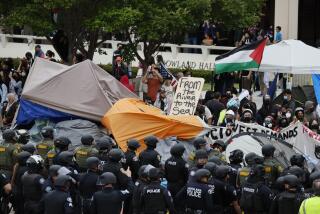Animal Rights Group May Have Hurt Monkey, U.S. Says
- Share via
RIVERSIDE — Animal rights activists may have accidentally inflicted injuries on a research monkey at UC Riverside last spring and then tried to cover it up by doctoring evidence in the hope of blaming the injuries on university researchers, federal officials suggested Thursday.
The charge, denied by a spokesman for the animal rights activists, was contained in a report by the National Institutes of Health that also cleared the University of California, Riverside, of allegations of mistreating research animals.
The monkey in question was one of 467 animals taken in a raid last April 21 by at least eight members of the underground Animal Liberation Front who broke into the university’s Life Sciences Building and caused more than $680,000 damage to equipment and experiments.
Allegations of mistreatment of the animals by researchers surfaced shortly afterward, when videotapes and photographs were circulated to the news media of an infant monkey with its eyelids sewn shut and bandaged for a “sight deprivation” experiment.
One of the videotapes showed Animal Liberation Front members removing the bandages to reveal that the monkey’s eyelids were cut.
However, UC Riverside spokesman Jack Chappell said the photographs and videotapes show that the bandages had been removed at least once before, which may have allowed the animal to have scratched open the sutures that had kept its eyelids shut. Chappell said the bandages seen on the videotape were not the originals.
“The monkey was unwrapped once and then rewrapped (for the video) by people outside the university for a show,” Chappell said at a press conference Thursday held to disclose the results of 10-month investigation by the National Institutes of Health.
“We’re disappointed to have a group who claims to have a moral and ethical commitment to see that animals are treated humanely doing some unsettling things,” said Dr. Robert Leonard, chairman of UC Riverside’s animal care committee.
In a statement, Dr. James B. Wyngaarden, the institutes’ director, observed that suturing shut a monkey’s eyelids “was not the most appropriate method for causing deprivation of sight and could have caused irritation to an animal’s cornea.”
He recommended that the university stop the practice. UC Riverside officials said Thursday that they already had decided to use other means, such as goggles and bandages.
All the animals taken in last year’s raid were inspected by veterinarians and then given new homes, according to another group of animal rights activists called People for the Ethical Treatment of Animals.
The National Institutes of Health report comes in the wake of its decision earlier this month to suspend all federal research funds to Columbia University, because of animal care violations.
In its final report on the UC Riverside investigation, the institutes dismissed charges of animal abuse at the university and found animal care to be “appropriate.”
In Washington, however, officials of People for the Ethical Treatment of Animals said allegations of fabricating evidence against UC Riverside are “absolutely false and show just how far researchers will go to continue torturing animals.”
A man identifying himself as an Animal Liberation Front member who conducted the 1984 raid told The Times that the underground group is “resolved to save even more animals, with more and more people getting involved.”
He conceded that UC Riverside “may win public opinion this afternoon.”
The institutes’ report had been reviewed by an independent, ad hoc committee, and it too suggested that the monkey may have been harmed by Animal Liberation Front members.
According to the ad hoc committee review:
“The videotape made by the ALF showing the use of sharp pointed scissors to remove the head bandage, failures to swaddle the infant primate’s hands and feet to avoid accidents and the exposure of a light-deprived primate to intense light for photographic purposes demonstrates a lack of empathy on the part of the ALF for this infant primate.”
In San Francisco, meanwhile, other animal rights activists announced plans for an April protest at research laboratories in California, Pennsylvania, New York and Washington. Among their demands is that they be allowed to make unannounced inspections.
Lou Fintor reported from Washington
More to Read
Sign up for Essential California
The most important California stories and recommendations in your inbox every morning.
You may occasionally receive promotional content from the Los Angeles Times.














